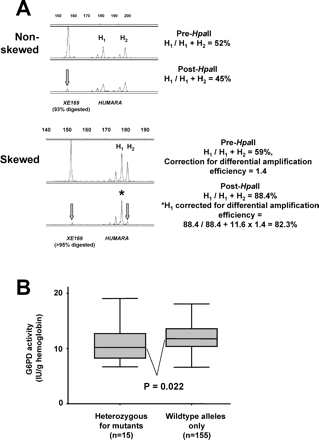P
Peatness
Guest
I've been wondering about the possible onset of this condition in adults either due to age or drug induced and came across these studies.

 academic.oup.com
academic.oup.com
From the article
The increase in G6PD deficiency with age will have to be shown in larger numbers of persons in other populations, given the relatively small number of affected persons observed in this study. Furthermore, we have studied persons older than 80 years, because the frequency of skewing of the X chromosome starts to increase sharply in women older than 70–80 years (22), and our previous study showed that an increase of G6PD deficiency due to skewing occurred mostly in women older than 70 years (6). A study of women aged 60 years [when skewing starts to rise (22)] to 80 years will be needed to define the risk in this age group. To validate the clinical significance of our observations, a systemic study investigating the response to oxidizing drugs in elderly women deficient in G6PD due to X-chromosome skewing will be needed. Alternatively, elderly women with adverse reactions to oxidizing drugs can be studied to determine whether they have significantly increased frequencies of G6PD deficiency. Although both topics are outside the scope of this report, they will be of interest to future studies. Finally, with the high frequency of G6PD mutations in many Asian, Mediterranean, and African populations (1,2) and increasing longevity, potential heterozygous elderly women at risk of age-related G6PD deficiency are numerous, constituting a worldwide health problem. Physicians should be aware of this risk, and it will be prudent to check the G6PD status of elderly women of these populations before prescribing drugs with oxidizing properties.

 pubmed.ncbi.nlm.nih.gov
pubmed.ncbi.nlm.nih.gov
From the article
A 37-year-old man presented with symptoms consistent with adult-onset Still's disease. Fever and leukocytosis were prominent, and the patient was started on high-dose aspirin for possible acute rheumatic fever. He developed severe anemia as a result of glucose-6-phosphate dehydrogenase deficiency. His treatment was changed to naproxen, and he recovered with restoration of his hematologic parameters. Although Still's disease is frequently accompanied by mild-to-moderate anemia, the development of severe anemia should raise the possibilities of hemolysis secondary to glucose-6-phosphate dehydrogenase deficiency.

 pubmed.ncbi.nlm.nih.gov
pubmed.ncbi.nlm.nih.gov

 www.ncbi.nlm.nih.gov
www.ncbi.nlm.nih.gov

 blog.healthmatters.io
blog.healthmatters.io
Drug names in RED are of high risk to all deficiency variants. Names in GREEN are of low risk.

 chrismasterjohnphd.substack.com
chrismasterjohnphd.substack.com

Glucose-6-Phosphate Dehydrogenase Deficiency in Female Octogenarians, Nanogenarians, and Centenarians
Abstract. Background. Age-related skewing of X-chromosome inactivation leading to glucose-6-phosphate dehydrogenase (G6PD) deficiency in elderly women in a
From the article
The increase in G6PD deficiency with age will have to be shown in larger numbers of persons in other populations, given the relatively small number of affected persons observed in this study. Furthermore, we have studied persons older than 80 years, because the frequency of skewing of the X chromosome starts to increase sharply in women older than 70–80 years (22), and our previous study showed that an increase of G6PD deficiency due to skewing occurred mostly in women older than 70 years (6). A study of women aged 60 years [when skewing starts to rise (22)] to 80 years will be needed to define the risk in this age group. To validate the clinical significance of our observations, a systemic study investigating the response to oxidizing drugs in elderly women deficient in G6PD due to X-chromosome skewing will be needed. Alternatively, elderly women with adverse reactions to oxidizing drugs can be studied to determine whether they have significantly increased frequencies of G6PD deficiency. Although both topics are outside the scope of this report, they will be of interest to future studies. Finally, with the high frequency of G6PD mutations in many Asian, Mediterranean, and African populations (1,2) and increasing longevity, potential heterozygous elderly women at risk of age-related G6PD deficiency are numerous, constituting a worldwide health problem. Physicians should be aware of this risk, and it will be prudent to check the G6PD status of elderly women of these populations before prescribing drugs with oxidizing properties.

Adult-onset Still's disease associated with G6PD deficiency: a case report and literature review - PubMed
A 37-year-old man presented with symptoms consistent with adult-onset Still's disease. Fever and leukocytosis were prominent, and the patient was started on high-dose aspirin for possible acute rheumatic fever. He developed severe anemia as a result of glucose-6-phosphate dehydrogenase...
From the article
A 37-year-old man presented with symptoms consistent with adult-onset Still's disease. Fever and leukocytosis were prominent, and the patient was started on high-dose aspirin for possible acute rheumatic fever. He developed severe anemia as a result of glucose-6-phosphate dehydrogenase deficiency. His treatment was changed to naproxen, and he recovered with restoration of his hematologic parameters. Although Still's disease is frequently accompanied by mild-to-moderate anemia, the development of severe anemia should raise the possibilities of hemolysis secondary to glucose-6-phosphate dehydrogenase deficiency.
G6PD Deficiency Association - Home
The first Web site established to offer information for G6PD deficient persons. Established in 1995 with the help of the late Ernest Beutler M.D. and the active support of Lucio Luzzatto M.D. Includes official list of drugs to avoid along with trade-names, printable brochure, forum and mailing...
www.g6pd.org
Glucose-6-phosphate dehydrogenase deficiency contributes to metabolic abnormality and pulmonary hypertension

Glucose-6-phosphate dehydrogenase deficiency contributes to metabolic abnormality and pulmonary hypertension - PubMed
We have previously reported that several patients with idiopathic pulmonary hypertension (PH) had different types of G6PD deficiency. However, the role of G6PD in PH is multifactorial because G6PD is involved in controlling oxidative stress, metabolic switch, and red blood cell fragility. To...
Impact of glucose-6-phosphate dehydrogenase deficiency on the pathophysiology of cardiovascular disease

Impact of glucose-6-phosphate dehydrogenase deficiency on the pathophysiology of cardiovascular disease
Glucose-6-phosphate dehydrogenase (G6PD) catalyzes the rate-determining step in the pentose phosphate pathway and produces NADPH to fuel glutathione recycling. G6PD deficiency is the most common enzyme deficiency in humans and affects over 400 million ...

What is G6PD? High and low values | Lab results explained
– Glucose-6-phosphate dehydrogenase (G6PD) is an enzyme involved in energy production. – G6PD is found in all cells, including red blood cells (RBCs) and helps protect them from certain…
 blog.healthmatters.io
blog.healthmatters.io
Drug names in RED are of high risk to all deficiency variants. Names in GREEN are of low risk.

044: Nutritional strategies for glucose 6-phosphate dehydrogenase (G6PDH) deficiency.
Masterjohn Q&A Files Episode 44
Last edited by a moderator:
